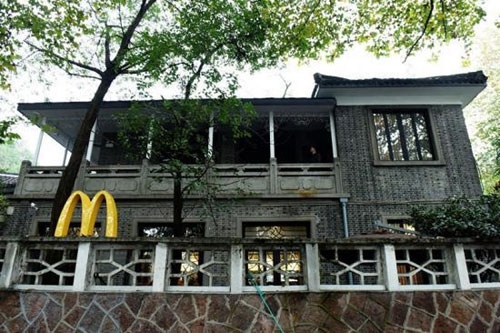
A McDonald’s cafe opens in former residence of Chiang Ching-kuo. [Photo/Oriental Morning Post]
Fast food chain McDonald's recently opened a cafe in the main building of the former residence of historical figure Chiang Ching-kuo, former Taiwan leader, setting off public debate.
The newly opened McDonald's cafe is decorated with posters and pictures telling the story of its former owners.
The historical complex, built in Hangzhou city, Zhejiang province in 1931, is a wood and brick villa consisting of two buildings: The main house and a wing building. The latter was rented by coffee chain Starbucks and opened for business more than one month ago. Now the complex has been partitioned and visitors can only enter each of the building separately.
Chiang Ching-kuo, the eldest son of Chiang Kai-shek who was an influential member of the Kuomintang (KMT), the Chinese Nationalist Party, and retreated to Taiwan after the failure of civil war. Chiang Ching-kuo ruled Taiwan during the late 1970s to 1980s and made great contribution to its reunion to mainland.
The commercial move stirred strong public debate, with Internet users having divided feelings over the situation. Some said it is wrong to commercialize historical sites while others said that business can be beneficial to both visitors and the building.
"Those who said the commercial move is wrong should go to the venue and have a look. McDonald’s hasn't changed its architecture, nor has it done any odd decoration. The business protects the site and brings convince to the visitors at the same time," said Weibo user Gen711xuezishi.
"Reasonable development to old architectures is a good thing. The building can lose its value if kept unused," said another with Weibo name Wolaizidong01.
"Look at the name plate of the building! It reads as 'historical relic protection site', so the place should be preserved as a way of cultural advancement, instead of being commercialized, "Weibo user cyx998 argued.
The contrasting views echo the opinions of scholar too.
"The former residences of cultural and historical celebrities among the West Lake (in Hangzhou city) are part of world's cultural heritage. Protection should be the top priority. Their social value shall be addressed first," said Rong Yuzhong, secretary general of Hangzhou Ancient Capital Culture Research Association, in an earlier interview with Qianjiang Evening News.
However, there are no laws or regulations banning business operations in historical architectures so far, and therefore, as some scholars suggest, there should not be direct intervention.
The property right of the house belongs to the Zhejiang Provincial Government Offices Administration and one of its official Liu Haisheng indicates that there was little trace of the Chiang family left in the house where they only lived for one month and that the commercial usage would provide enough funds to its further preservation.





